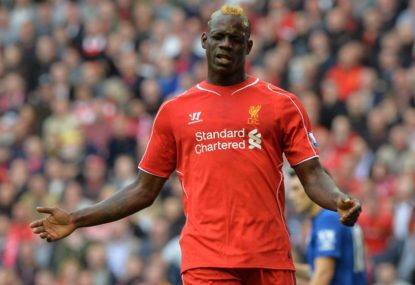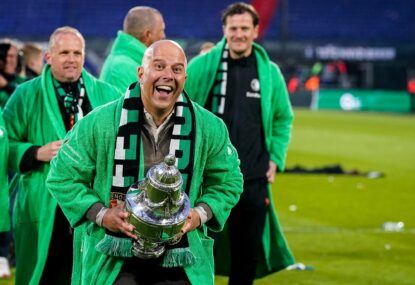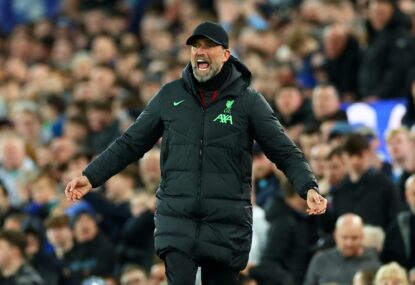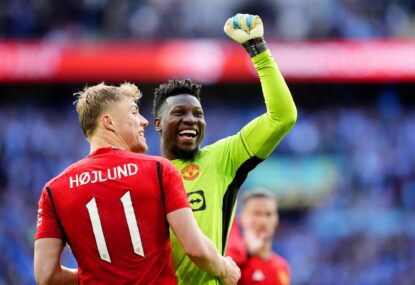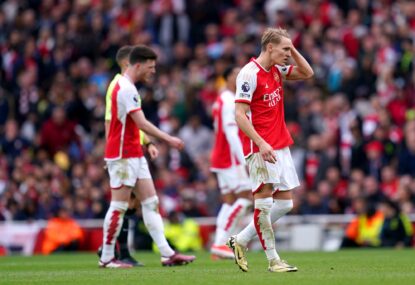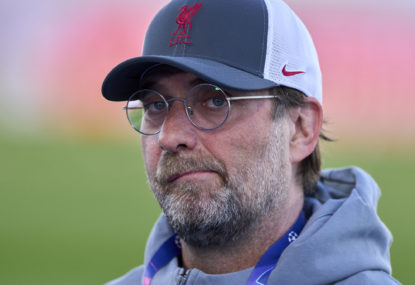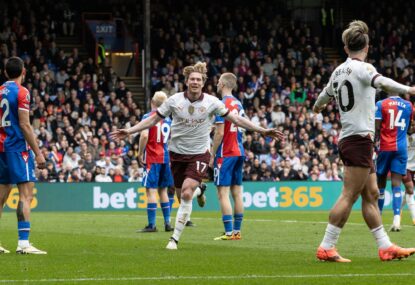Two of the English Premier League’s biggest clubs, Manchester United and Liverpool, signed marquee strikers to lead their team to glory in the 2014-15 season; it’s safe to say that both deals have turned into expensive disasters.
Let’s wind our minds back to the moments before the opening game of the 2014-15 Premier League season, those fabulous days of yore where possibilities were endless and potential was tantalisingly unrealised.
Hull City’s strangely flamboyant playing roster was immediately going to click, Southampton were bracing themselves for a certain relegation scrap and Liverpool and Manchester United were smugly basking in the stunning incandescence of their newly minted strikers. Radamel Falcao and Mario Balotelli had arrived in England and we were all looking at each other, eyebrows raised and bottom lips bitten, smiling feverishly and rubbing our hands together at the tastiness to come.
The two famous red clubs had two star strikers and, in the absence of Luis Suarez and the relative decline of Robin van Persie, it looked as if both Brendan Rodgers and Louis van Gaal were buying appropriately.
Questions as to Balotelli’s suitability to Liverpool’s style, or more precisely his utter dissimilarity to Suarez, were drowned out by the surprising freshness of the transfer, and his disappointing form during the back end of his time in Italy was being wilfully ignored; most preferred to shine a light on his productive start at AC Milan, as well as his better moments from his tempestuous spell at Manchester City.
In Manchester, memories were just as selective, and hopes were equally high. After arriving with aplomb on deadline day, Falcao seemed gilded in gold, a patina he’d developed at Porto and Atletico Madrid. His odd sabbatical on the French Riviera, though more recent, formed a less visible part of his reputation.
On top of this, Falcao’s serious knee injury, which had ended his 2014 World Cup dreams, was apparently deemed not significant enough a factor to scupper United’s £20 million loan package. “It’s a good problem to have” was largely the stance being taken on van Gaal’s inevitable selection dramas for the striker’s position.
Still, the season was yet to begin and so hopes were understandably high. Team chemistry would take time, even with the money at stake. The pre-season smiles were decidedly more desperate in Merseyside, because Suarez had taken a large number of vital goals with him when he left. Not only that, his departure removed vital movement, work ethic and interplay from Liverpool’s attack.
The attacking players that had been brought in thus far, Adam Lallana, Rickie Lambert and Lazar Markovic, were far from adequate replacements. Defensive issues had plagued Rodgers’ side last season, and they no longer had someone up front to single handedly out-score their opponents. For a moody, hot-and-cold striker to enter the scene at this point, with every Liverpudlian eyeball, bloodshot and twitchily fretful, trained upon him, well, anyone would have felt the pressure.
Balotelli struggled as soon as the season started, and continues to as Liverpool labour past the halfway point of the season. In 12 appearances so far, he has failed to score a single league goal or provide a single assist. His square-peggedness in the round hole that is Liverpool’s system is even more ill-fitting than we or, one assumes, Rodgers anticipated.
And speaking of Rodgers, he hasn’t exactly helped the situation. For your manager to balk publicly, to jest with journalists after your debut about the “fact” that you, a professional footballer, had to be told, like a child, to mark someone at a defensive corner, hardly serves to build a respectful professional rapport.
Even if this is true, and Balotelli has never before had to contribute to this part of the team defence, what on Earth does Rodgers stand to gain by scoffing about it in public? The press conference where the comments in question were made stank of Rodgers arrogantly showing just how big a manager he was, taming the shrew of Mario, and telling him who’s boss around here, after their 3-0 win over Spurs.
Balotelli’s mood is fragile at the best of times, as is his relationships with managers. Rodgers had already started poorly, when he described signing Balotelli as “a calculated risk”, not the most glowing of descriptions with which to start a career at a new club. Such a statement may be true, but the manager should not be making these comments when announcing a new signing.
After starting 8 of Liverpool’s first 11 games, Balotelli has appeared only 3 times in the next 11, due to a combination of injury, illness and very, very poor form. The Guardian journalist Raphael Honigstein said on the Guardian Football Weekly podcast that
the permanent recruitment and subsequent failure of Balotelli by Rodgers at Liverpool was tantamount to a sackable offence.
Rodgers has since eased pressure of this kind with Liverpool losing just 1 of their last 10 matches, though this upturn, effective in terms of points, has had nothing to do with any contribution made by Balotelli. At this point, it’s Lazar Markovic, not Balotelli, who’s becoming the more important attacking cog for Liverpool.
It’s the permanence of the Balotelli situation at Liverpool that makes their striking transgression more damaging. Falcao and United’s relationship is, as it stands, an expensive one but also an impermanent one. The blockbuster sensation that was the deadline day deal somewhat overshadowed the fact that Falcao was joining United on one of these strange, high-profile loan agreements that seem to be the vogue in these days of financial fair play.
This looks like highly sensible business now, as we watch Falcao miss absolute sitters against Queens Park Rangers. To be fair, Falcao has been much more effective than Balotelli, not that this is difficult. Three goals and three assists in 13 appearances is a fairly good return, although for a player of Falcao’s towering reputation and wage, fairly good isn’t really good enough.
But what’s most problematic for United fans is that van Gaal seems to prefer to bring his marquee signing off the bench, and that’s assuming he’s in the matchday squad at all. He was left out of the team entirely in the loss against Southampton, and van Gaal confirmed that the decision was not due to an injury.
Youth product James Wilson seems to be above the Colombian in the pecking order, and with Falcao haplessly missing a trio of golden chances against QPR, as you can see here, here and here, and Wilson scoring his saved shot at the second attempt to put United 2-0 up, van Gaal is looking at least partially justified.
But why the constant run of games to the often ineffective Robin van Persie? The Dutchman has missed only two of United’s league games, and in every match he’s played in, he has started. Were Falcao to receive such preferential treatment, perhaps his agent, Jorge Mendes, wouldn’t be making “unhelpful” comments about the future of his star client.
All of it, the last minute signing, the mammoth wage, the sporadic first team appearances, the murky discussions about Falcao’s cut-price future, smacks of a disorganised, impulsive way of constructing a team.
But, as van Gaal reshuffled his three-at-the-back formation after a messy first half against a competitive QPR, and Phil Jones was seen taking a couple of corners, it’s clear that disorganisation has become a hallmark of United’s season. They seem to keep collecting unconvincing wins, with the exception of the loss to Southampton, so as long as this continues, a place in the Champions League looks likely.
A question is, week by week, creeping into the seasonal narratives of these two grand footballing institutions; what was the point? It’s safe to say that Balotelli’s transfer has been a disaster for Liverpool, and at best, a gigantic waste of money.
At United, with swirling rumours of a squillion pound move for Lionel Messi, money is hardly any object. But the Falcao loan has still done damage, namely in the form of presenting United even more starkly in this new, unflattering light; that of a club who will flippantly purchase a great player just because he’s available, and not because he’s necessary. Money is piling up on the benches at United and Liverpool, and it’s not a good look.





























































































